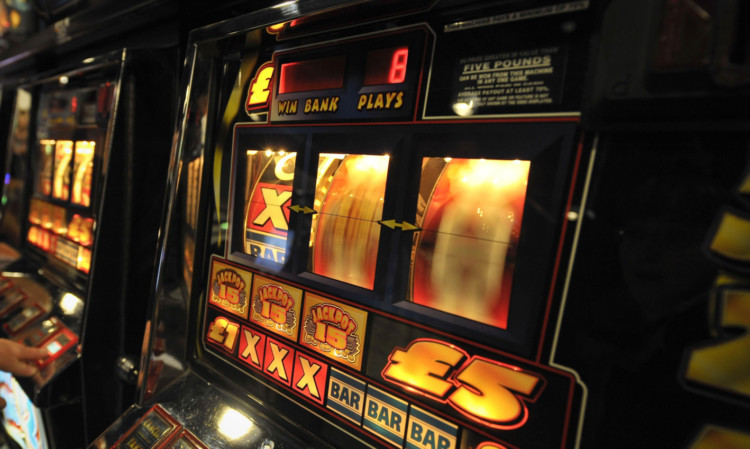Gamblers in Dundee spent more than £130 million in slot machines last year nearly £1,000 for every adult in the city.
Anti-gambling campaigners say the shocking figure is due to bookmakers targeting poor areas where fixed odds betting terminals (FOBT) are most popular.
The Campaign for Fairer Gambling calculated the figures using information from the Gambling Commission and the Office for National Statistics.
Spokesman Adrian Parkinson said: “The bookmaking sector denies there is any increase in the number of betting shops.
“However, we believe there is an explosion in their number in certain areas, but a decrease in other areas.
“Bookmakers are coalescing around certain areas that are more profitable in terms of FOBTs and moving out of other areas where FOBTs are not as appealing.
“The truth is that FOBTs do not appeal to somebody who is more affluent.”
Fixed-odds machines allow players to bet on the outcome of various games, such as roulette.
The minimum bet is £1 and the maximum must be less than the £500 payout. Gamblers can spend £300 a minute on the machines a total of £18,000 per hour.
Bookmakers are allowed to have up to four machines on their premises.
Dundee City Council licensing convener Stewart Hunter said: “We will have to be assured before we grant any licence that there is not any over-provision in an area.”
The figures were calculated by Westminster parliamentary constituencies.
Those living in Dundee West spent an average of £1,146.49 compared to the £816.90 spent by those in Dundee East.
Punters in the Falkirk constituency spent £114.5 million £1,462.30 per person.
Adults in Gordon Brown’s constituency towns of Kirkcaldy and Cowdenbeath spend an average of £1,212.75, while those in Dunfermline and West Fife spent £1,146.49.
Across Glasgow people spent £800m on FOBTs, more than £1,400 per adult in the city.
A spokesman for the Association of British Bookmakers said: “No betting shop anywhere in the country can open without a licence.
“Just as is the case with any other retailer, a betting shop will open in response to and meet customer demand.
“Gaming machines themselves have been in shops for 12 years, so are not new products, but they are very popular with our eight million customers.”
Gambling legislation was liberalised in 2005 by the Labour government.
However, the party’s current leader Ed Miliband has called for a rethink on the policy over fears it is harming the UK’s poorest communities.
A study by an American University earlier this year revealed that rats could also become addicted to the machines when rewarded with treats.
However, researchers at the University of British Columbia have now found ways to block the chemicals which cause compulsive behaviour in animals, and they believe this may also work on humans.
Drugs can be used to block the dopamine D4 receptors that stimulate sensation of pleasure after winning a payout.
smorkis@thecourier.co.uk and the Office for National Statistics.
Spokesman Adrian Parkinson said: “The bookmaking sector denies there is any increase in the number of betting shops.
“However, we believe there is an explosion in their number in certain areas, but a decrease in other areas.
“Bookmakers are coalescing around certain areas that are more profitable in terms of FOBTs and moving out of other areas where FOBTs are not as appealing.
“The truth is that FOBTs do not appeal to somebody who is more affluent.”
Fixed-odds machines allow players to bet on the outcome of various games, such as roulette.The minimum bet is £1 and the maximum must be less than the £500 payout.
Gamblers can spend £300 a minute on the machines a total of £18,000 per hour. Bookmakers are allowed to have up to four machines on their premises.
Dundee City Council licensing convener Stewart Hunter said: “We will have to be assured before we grant any licence that there is not any over-provision in an area.”
The figures were calculated by Westminster parliamentary constituencies.
Those living in Dundee West spent an average of £1,146.49 compared to the £816.90 spent by those in Dundee East.
Punters in the Falkirk constituency spent £114.5 million £1,462.30 per person.
Adults in Gordon Brown’s constituency towns of Kirkcaldy and Cowdenbeath spend an average of £1,212.75, while those in Dunfermline and West Fife spent £1,146.49.
Across Glasgow people spent £800m on FOBTs, more than £1,400 per adult in the city.
A spokesman for the Association of British Bookmakers said: “No betting shop anywhere in the country can open without a licence.
“Just as is the case with any other retailer, a betting shop will open in response to and meet customer demand.
“Gaming machines themselves have been in shops for 12 years, so are not new products, but they are very popular with our eight million customers.”
Gambling legislation was liberalised in 2005 by the Labour government.
However, the party’s current leader Ed Miliband has called for a rethink on the policy over fears it is harming the UK’s poorest communities.
A study by an American University earlier this year revealed that rats could also become addicted to the machines when rewarded with treats.
However, researchers at the University of British Columbia have now found ways to block the chemicals which cause compulsive behaviour in animals, and they believe this may also work on humans.
Drugs can be used to block the dopamine D4 receptors that stimulate sensation of pleasure after winning a payout.
